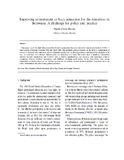| dc.contributor.author | Pansiri, N.O. | |
| dc.date.accessioned | 2010-06-21T10:33:26Z | |
| dc.date.available | 2010-06-21T10:33:26Z | |
| dc.date.issued | 2008-07 | |
| dc.identifier.citation | Pansiri, N.O. (2008) Improving commitment to basic education for the minorities in Botswana: a challenge for policy and practice, International Journal of Educational Development, Vol. 28, No. 4, pp. 446-459 | en_US |
| dc.identifier.issn | 0738-0593 | |
| dc.identifier.uri | http://hdl.handle.net/10311/521 | |
| dc.description.abstract | This paper is part of a study that assessed the level of commitment of primary schools of remote area dwellers (RADs) to basic education between October 2004 and April 2005. The research question focused on the level of commitment of schools to universal basic education, school–community partnership in school governance and parental involvement in the way the curriculum was delivered. Questionnaire and interviews were used. The results show a significant relationship between teachers’ perceptions and variables such as district, qualifications, age, location, and experience. There is consistency between teachers’ perceptions and children's academic performance. It has been found that learner achievement in RADs schools is low and that parents are not actively involved in their children's education due to the policy environment and school management practices. | en_US |
| dc.language.iso | en | en_US |
| dc.publisher | Elsevier Ltd. http://www.sciencedirect.com | en_US |
| dc.subject | Basic education | en_US |
| dc.subject | School-community partnership | en_US |
| dc.subject | Parental involvement | en_US |
| dc.subject | Botswana | en_US |
| dc.title | Improving commitment to basic education for the minorities in Botswana: a challenge for policy and practice | en_US |
| dc.type | Published Article | en_US |

